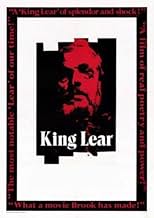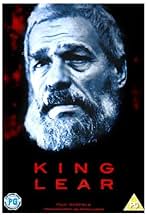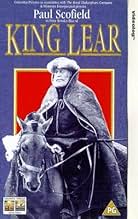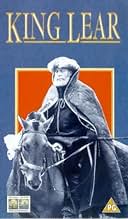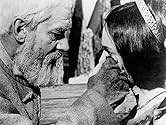Füge eine Handlung in deiner Sprache hinzuKing Lear divides his kingdom among his daughters, giving great importance to their protestations of love for him. When Cordelia refuses to idly flatter the old man, he banishes her and turn... Alles lesenKing Lear divides his kingdom among his daughters, giving great importance to their protestations of love for him. When Cordelia refuses to idly flatter the old man, he banishes her and turns for support to his remaining daughters.King Lear divides his kingdom among his daughters, giving great importance to their protestations of love for him. When Cordelia refuses to idly flatter the old man, he banishes her and turns for support to his remaining daughters.
- Regie
- Drehbuch
- Hauptbesetzung
- Auszeichnungen
- 2 Gewinne & 1 Nominierung insgesamt
Empfohlene Bewertungen
Much reviled at the time of it's release, this heavily cut, Danish
co-production horrified critics with it's bleak as possible take on what
some consider the world's greatest play.
Obviously influenced by nortic flicks from Dryer to Bergman,
Peter Brook shot this as a midevil horror show; and Pauline Kael called
it his "Night Of The Living Dead."
While certainly unfair to the scope of the Bard's vision, the
film is undeniably facinating; though sometimes tedious too. In the best
parts it comes alive with a vivid wickedness, you can certainly see how
Lear's daughter's came to hate his guts!
So, even if it does mutilate a classic, this film is pretty
amazing and highly recommendable. A dark product of it's own time, you
will scarcely see a Lear like this again.
co-production horrified critics with it's bleak as possible take on what
some consider the world's greatest play.
Obviously influenced by nortic flicks from Dryer to Bergman,
Peter Brook shot this as a midevil horror show; and Pauline Kael called
it his "Night Of The Living Dead."
While certainly unfair to the scope of the Bard's vision, the
film is undeniably facinating; though sometimes tedious too. In the best
parts it comes alive with a vivid wickedness, you can certainly see how
Lear's daughter's came to hate his guts!
So, even if it does mutilate a classic, this film is pretty
amazing and highly recommendable. A dark product of it's own time, you
will scarcely see a Lear like this again.
What's good: Alan Webb's Gloucester and Jack MacGowran's Fool both threaten to steal the picture. Webb is immensely touching in his attempted suicide, but then, I have trouble thinking of a bad Gloucester. Cyril Cusack as Albany and Tom Fleming as Kent should also be praised, and Patrick Magee is creepy as ever as Cornwall.
Henning Kristiansen's cinematography is stunning, rendering Jutland in winter the most inhospitable Learscape ever, and this is the same fellow who shot the lush "Babette's Feast" in the same general location! When Lear and friends are outside being battered by the storm, we see the ungrateful villains inside basking in the warmth of a gigantic roaring fireplace. The visual contrast has never been greater. When Poor Tom's cold, he's really cold in real snow, not just clasping himself and shivering on cue.
Peter Brook's productions often involve wholesale cuts and rearrangements, plus hefty doses of non-authorial content. Yes, this Lear is cut to the bone, the style owes much to Bergman, Beckett, Brecht, etc.
The criminal waste is that Paul Scofield was a major Lear of his generation, and it's gutted here. His magnificent voice is thinned out to a thread, and much of the time the character is distant, veiled and under-energized. His disintegration arouses pity, but no audience involvement. We watch him die from a million miles away, and lose more than we gain with this application of alienation technique.
By the same token, Irene Worth's whispered Goneril is not the volcano we want. For example, she is incapable of expressing lust for Edmund, and that's a crucial omission, not in the text, but in the performance. Two fine actors are caught at considerably less than their best, giving the director what he wanted.
The energy level all around is a bit low, which kills much of what remains of Shakespeare's language, but what really hurts is the leaden pace. Considering half the play is missing, we start slowly, and after Gloucester hits the beach, grind to a complete halt. Entropy is total. Even with the text gutted and filleted, the last half hour of the film feels longer than many complete plays.
For DVD versions with complete texts, don't overlook Jonathan Miller's neurologically-informed production for the BBC with Michael Hordern and Brenda Blethyn. The more mainstream, star-studded Olivier video is an automatic choice for many.
However, another abbreviated version directed by Peter Brook features perhaps the best reading of Shakespeare's Lear of them all, from Orson Welles. This 90-minute condensation from the early days of live television also features Alan Badel, Beatrice Straight and Micheal MacLiammoir. First you must get past the resourceful but limited visuals, two cameras in a single studio running the whole play live without a break. The reward is that no one, no one does Lear's poetry more clearly, simply, powerfully and beautifully than Orson Welles.
Henning Kristiansen's cinematography is stunning, rendering Jutland in winter the most inhospitable Learscape ever, and this is the same fellow who shot the lush "Babette's Feast" in the same general location! When Lear and friends are outside being battered by the storm, we see the ungrateful villains inside basking in the warmth of a gigantic roaring fireplace. The visual contrast has never been greater. When Poor Tom's cold, he's really cold in real snow, not just clasping himself and shivering on cue.
Peter Brook's productions often involve wholesale cuts and rearrangements, plus hefty doses of non-authorial content. Yes, this Lear is cut to the bone, the style owes much to Bergman, Beckett, Brecht, etc.
The criminal waste is that Paul Scofield was a major Lear of his generation, and it's gutted here. His magnificent voice is thinned out to a thread, and much of the time the character is distant, veiled and under-energized. His disintegration arouses pity, but no audience involvement. We watch him die from a million miles away, and lose more than we gain with this application of alienation technique.
By the same token, Irene Worth's whispered Goneril is not the volcano we want. For example, she is incapable of expressing lust for Edmund, and that's a crucial omission, not in the text, but in the performance. Two fine actors are caught at considerably less than their best, giving the director what he wanted.
The energy level all around is a bit low, which kills much of what remains of Shakespeare's language, but what really hurts is the leaden pace. Considering half the play is missing, we start slowly, and after Gloucester hits the beach, grind to a complete halt. Entropy is total. Even with the text gutted and filleted, the last half hour of the film feels longer than many complete plays.
For DVD versions with complete texts, don't overlook Jonathan Miller's neurologically-informed production for the BBC with Michael Hordern and Brenda Blethyn. The more mainstream, star-studded Olivier video is an automatic choice for many.
However, another abbreviated version directed by Peter Brook features perhaps the best reading of Shakespeare's Lear of them all, from Orson Welles. This 90-minute condensation from the early days of live television also features Alan Badel, Beatrice Straight and Micheal MacLiammoir. First you must get past the resourceful but limited visuals, two cameras in a single studio running the whole play live without a break. The reward is that no one, no one does Lear's poetry more clearly, simply, powerfully and beautifully than Orson Welles.
in a moment of irony that could occur only in cinema, the definitive version of Shakespeare's 'king Lear' is Kurosawa akira's 1985 'ran'. only Kurosawa - at the end of his own career and looking back at at a century of blindness socially and politically, that dragged his culture through the horrors of the Tojo regime and the second world war - could grasp the essential insight of Shakespeare's vision of political perversion arising from simple but fundamental personal mistakes in judgment.
brook, of course, doesn't go after that. in fact, the issues just noted have been missed just about entirely by every American and British version of the play i've seen, even Laurence Olivier's farewell performance on television just before he died.
so when we come to brook's film, we have to let go of the hope that this will be the 'ur-Lear' that we seem to have misplaced in the west ever since the Elizabethan era.
in fact, let's let go of Shakespeare completely, here - this is a peter brook film, and brook is actually after something fundamentally cinematic - but not necessarily Shakespearean.
brook's film is a relentless portrayal of the world turned upside down. the most memorable quality of the film - and it stuck to me for many years - is the camera work, that gets unsteadier and more rapidly cut as the film goes on, until the audience feels trapped inside a house in a hurricane - and one that's quickly falling apart.
to find some ground in this visual catastrophe, the audience will desperately grab onto Shakespeare's words or the fine performances by the wonderful cast - but be warned - that's not really going to help much, and it's not supposed to.
brook, who made his name by approaching theatrical stage performances in a rather daring visual style, clearly wanted to see how far he could push the medium - the audience will have to decide whether he's successful - but the effort itself is worthy of respect.
brook, of course, doesn't go after that. in fact, the issues just noted have been missed just about entirely by every American and British version of the play i've seen, even Laurence Olivier's farewell performance on television just before he died.
so when we come to brook's film, we have to let go of the hope that this will be the 'ur-Lear' that we seem to have misplaced in the west ever since the Elizabethan era.
in fact, let's let go of Shakespeare completely, here - this is a peter brook film, and brook is actually after something fundamentally cinematic - but not necessarily Shakespearean.
brook's film is a relentless portrayal of the world turned upside down. the most memorable quality of the film - and it stuck to me for many years - is the camera work, that gets unsteadier and more rapidly cut as the film goes on, until the audience feels trapped inside a house in a hurricane - and one that's quickly falling apart.
to find some ground in this visual catastrophe, the audience will desperately grab onto Shakespeare's words or the fine performances by the wonderful cast - but be warned - that's not really going to help much, and it's not supposed to.
brook, who made his name by approaching theatrical stage performances in a rather daring visual style, clearly wanted to see how far he could push the medium - the audience will have to decide whether he's successful - but the effort itself is worthy of respect.
Peter Brook has the knack of making his stagings completely his own while at the same time enhancing the character of the play. Thus in "Carmen" he turns it into something of a chamber play, and here in King Lear he stresses the primitivism of the play turning into almost something like a documentary of the dark ages. In especially the first part including the storm he is entirely successful, in spite of the rather experimental expressionism,and the realism of the primitive middle age settings in a landscape of only moors and snows, not a tree in the whole film, is effectively impressing. The actors are superb throughout, and Paul Scofield renders a very interesting interpretation of the old man losing himself with occasional magnificent outbursts of powerful rage. The play is shortened, of course, you can't put all of a Shakespeare play into a film, (I believe the only successful attempt at that was Kenneth Branagh's "Hamlet" and very commendable as such,) while here the text abbreviations unfortunately suffer, the cuts being so obvious. Another flaw is that the articulation is not very good - it was fashionable in the end of the 60s to allow actors to talk on stage like as if they talked naturally, but theatre can't do without rhetoric; and especially with a language like this, which is the very essence of the play, you can't trifle with it, every word has to be pronounced distinctly, or it isn't Shakespeare.
Towards the end the direction gets more sloppy, the intensity loses its grip, while the apocalyptic battle scenes crown the direction. The austere scenery throughout I believe will be what you most will remember of this film adaptation, which couldn't be more impressive, while I think I would prefer the Russian version from about the same time as more convincingly Shakespearian. Since many years I have been waiting for an opportunity to see the Laurence Olivier version from 1983.
Towards the end the direction gets more sloppy, the intensity loses its grip, while the apocalyptic battle scenes crown the direction. The austere scenery throughout I believe will be what you most will remember of this film adaptation, which couldn't be more impressive, while I think I would prefer the Russian version from about the same time as more convincingly Shakespearian. Since many years I have been waiting for an opportunity to see the Laurence Olivier version from 1983.
"King Lear" is not one of my favourite Shakespeare plays (sacrilege indeed!) but I must say I find this film version immensely impressive and the best film version of Shakespeare I have seen.
The key to this is the direction of Peter Brook. Unquestionably this is an "arty" avant-garde production that has echoes of Bergman and Beckett as other reviewers have noted. For me this works extremely well. The choice of a barren Danish landscape in winter, the use of black and white, and unusual decision to eschew music all contribute to a very dark and bleak atmosphere. The director keeps viewers on their toes and presents a despairing tragedy.
There is nothing theatrical about this - quite rightly as this is a film version. The performances are restrained and measured. The acting is very strong - Patrick Magee particularly stands out as a very menacing Cornwall while Susan Engel and Irene Worth are fine as the manipulative elder sisters.
My only real reservation is that the climax of the film is rather rushed, with the numerous deaths needing a little more reflection. The suicide of Goneril is though extremely powerful. Lear's death is always poignant but the direction of it doesn't work completely.
Opinions are very mixed on this film but I certainly think it deserves attention. It would especially appeal to followers of Bergman and anyone who is struck by a dark tale.
The key to this is the direction of Peter Brook. Unquestionably this is an "arty" avant-garde production that has echoes of Bergman and Beckett as other reviewers have noted. For me this works extremely well. The choice of a barren Danish landscape in winter, the use of black and white, and unusual decision to eschew music all contribute to a very dark and bleak atmosphere. The director keeps viewers on their toes and presents a despairing tragedy.
There is nothing theatrical about this - quite rightly as this is a film version. The performances are restrained and measured. The acting is very strong - Patrick Magee particularly stands out as a very menacing Cornwall while Susan Engel and Irene Worth are fine as the manipulative elder sisters.
My only real reservation is that the climax of the film is rather rushed, with the numerous deaths needing a little more reflection. The suicide of Goneril is though extremely powerful. Lear's death is always poignant but the direction of it doesn't work completely.
Opinions are very mixed on this film but I certainly think it deserves attention. It would especially appeal to followers of Bergman and anyone who is struck by a dark tale.
Wusstest du schon
- WissenswertesBrook based this production on ideas expressed by Polish theater critic Jan Kott in the book "Shakespeare, Our Contemporary".
- Crazy CreditsNot only is there no music in the film, but there are no "ambient sounds" at all during the opening credits, giving the impression that they were filmed using no soundtrack whatsoever.
- VerbindungenFeatured in William Shakespeare - Ein Genie und seine Zeit: Folge #1.3 (2023)
Top-Auswahl
Melde dich zum Bewerten an und greife auf die Watchlist für personalisierte Empfehlungen zu.
- How long is King Lear?Powered by Alexa
Details
- Erscheinungsdatum
- Herkunftsländer
- Offizieller Standort
- Sprache
- Auch bekannt als
- Kral Lear
- Drehorte
- Produktionsfirmen
- Weitere beteiligte Unternehmen bei IMDbPro anzeigen
- Laufzeit2 Stunden 17 Minuten
- Farbe
- Sound-Mix
- Seitenverhältnis
- 1.66 : 1
Zu dieser Seite beitragen
Bearbeitung vorschlagen oder fehlenden Inhalt hinzufügen


